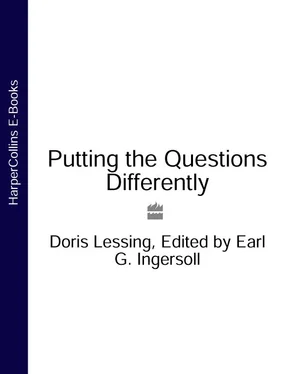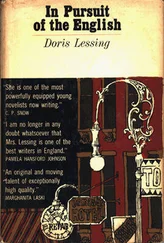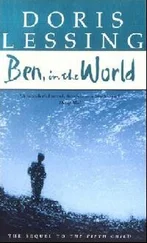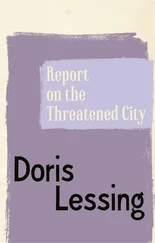But as the birth proceeded, the pain, the boredom, the cold, the misery (and the smell of war) diminished, until I was born with the sun rising in a glow of firelight.
Yes, but who created all this? Who made it up?
It wasn’t me, the normal “I” who conducts her life.
And of course, this question of I, who am I, what different levels there are inside of us, is very relevant to writing, to the process of creative writing about which we know nothing whatsoever. Every writer feels when he, she, hits a different level. A certain kind of writing or emotion comes from it. But you don’t know who it is who lives there. It is very frightening to write a story like “To Room 19,” for instance, a story soaked in emotions that you don’t recognize as your own.// That is a literary question, a problem to interest writers. But that creature being born wasn’t a “writer.” It was immensely ancient, for a start, and it was neither male nor female, and it had no race or nationality. I can revive the “feel” or “taste” of that creature fairly easily. It isn’t far off that creature or person you are when you wake up from deep sleep, and for a moment you don’t recognize your surroundings and you think: Who am I? Where am I? Is this my hand? You’re somebody, all right, but who?
The Inadequacy of the Imagination Jonah Raskin
Jonah Raskin’s interview was conducted on the campus of the State University of New York at Stony Brook in spring 1969. It originally appeared in New American Review 8 (1970) and was reprinted in A Small Personal Voice, ed. Paul Schlueter (Knopf, 1977). Copyright © 1970 by Jonah Raskin. Reprinted with permission.
Raskin:I felt that in your most recent novel, The Four-Gated City, you wanted to reach out directly to the new audience which has been shaped by television and the atmosphere of violence.
Lessing:I want to reach the youth. Maybe because I was determined to reach people the form of the book has been shot to hell. The first version was too long, and the second time I wrote it the form changed. I’ve had Children of Violence set up for twenty years. By the time I wrote the last volume I’d put myself into a damned cage, but it’s probably better now that I’ve heaved the rules out.//
Raskin:How do drugs fit into your sense of the changes of the mind?
Lessing:I took mescaline once. I’ve taken pot a bit. Drugs give us a glimpse of the future; they extricate us from the cage of time. When people take drugs they discover an unknown part of themselves. When you have to open up, when you’re blocked, drugs are useful, but I think it’s bad for people to make them a way of life because they become an end in themselves. Pot should be used with caution, but not banned. I’m against all this banning. I think people can expand and explore their minds without using drugs. It demands a great deal of discipline. It’s like learning a craft; you have to devote a lot of time, but if you can train yourself to concentrate you can travel great distances.
Raskin:In your fiction you explore large tracts through dreams, don’t you?
Lessing:Dreams have always been important to me. The hidden domain of our mind communicates with us through dreams. I dream a great deal and I scrutinize my dreams. The more I scrutinize, the more I dream. When I’m stuck in a book I deliberately dream. I knew a mathematician once who supplied his brain with information and worked it like a computer. I operate in a similar way. I fill my brain with the material for a new book, go to sleep, and I usually come up with a dream which resolves the dilemma.
Raskin:The dreams in The Golden Notebook are points of intensity and fusion, aren’t they? Anna sees fragments – a lump of earth from Africa, metal from a gun used in Indochina, flesh from people killed in the Korean War, a Communist party badge from someone who died in a Soviet prison – all of which represent crises in contemporary life.
Lessing:The unconscious artist who resides in our depths is a very economical individual. With a few symbols a dream can define the whole of one’s life, and warn us of the future, too. Anna’s dreams contain the essence of her experience in Africa, her fears of war, her relationship to Communism, her dilemma as a writer.
Raskin:Do you think that the Freudian concepts are valid?
Lessing:There are difficulties about the Freudian landscape. The Freudians describe the conscious as a small lit area, all white, and the unconscious as a great dark marsh full of monsters. In their view, the monsters reach up, grab you by the ankles, and try to drag you down. But the unconscious can be what you make of it, good or bad, helpful or unhelpful. Our culture has made an enemy of the unconscious. If you mention the word “unconscious” in a room full of people you see the expressions on their faces change. The word recalls images of dread and threat, but other cultures have accepted the unconscious as a helpful force, and I think we should learn to see it in that way too.
Raskin:How did you create the character of Mrs. Marks, “Mother Sugar,” in The Golden Notebook?
Lessing:My own psychotherapist was somewhat like Mrs. Marks. She was everything I disliked. I was then aggressively rational, antireligious, and a radical. She was Roman Catholic, Jungian, and conservative. It was very upsetting to me at the time, but I found out it didn’t matter a damn. I couldn’t stand her terminology, but she was a marvelous person. She was one of those rare individuals who know how to help others. If she had used another set of words, if she had talked Freud talk, or aggressive atheism, it wouldn’t have made a difference.//
Raskin:You’ve also been at the center of many political conflicts. Near the end of The Golden Notebook Anna says that “at that moment I sit down to write someone comes into the room, looks over my shoulder and stops me… It could be a Chinese peasant. Or one of Castro’s guerrilla fighters. Or an Algerian fighting in the FLN. They stand here in the room and they say, why aren’t you doing something about us, instead of wasting your time scribbling?” I feel a tension between my life as a writer and my political activity. Could you tell me how you have felt about this situation?
Lessing:// I am intensely aware of, and want to write about, politics, but I often find that I am unable to embody my political vision in a novel. I want to write about Chinese peasants, the Algerians in the FLN, but I don’t want to present them in false situations. I don’t want to leave them out either. I find it difficult to write well about politics. I feel that the writer is obligated to dramatize the political conflicts of his time in his fiction. There is an awful lot of bad socialist literature which presents contemporary history mechanically. I wanted to avoid that pitfall.
In the scene from The Golden Notebook, which you’ve mentioned, I was trying to introduce politics and history into Anna’s world.
I’m tormented by the inadequacy of the imagination. I’ve a sense of the conflict between my life as a writer and the terrors of our time. One sits down to write in a quiet flat in London and one thinks, Yes, there’s a war going on in Vietnam. The night before last, when we were having dinner here, the police were raiding the university and arresting students.
Raskin:How do you view the future?
Lessing:I’m very much concerned about the future. I’ve been reading a lot of science fiction, and I think that science-fiction writers have captured our culture’s sense of the future. The Four-Gated City is a prophetic novel. I think it’s a true prophecy. I think that the “iron heel” is going to come down. I believe the future is going to be cataclysmic.
Читать дальше












